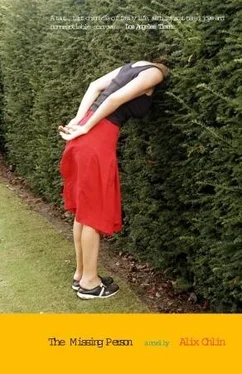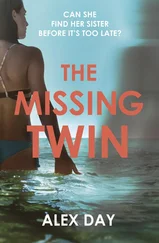I thought about my father too, wondering if Harold could possibly be right about him knowing Eva Kent. Maybe he was driving back from the labs in Los Alamos one day, stopped for lunch, and got lost — people always do in Santa Fe. Say he went into the Gallery Gecko to ask directions, and there she was, sitting beneath one of her paintings and luring potential buyers with her brittle talk and strange, striking looks. She was the kind of woman who talked people into things, and my stammering scientist father was an easy mark who found himself glued to the tile floor in the small gallery’s close, hot air. Eva told him her name and demanded to know his. “Arthur?” she said, smiling ferociously. “So do people call you Art?” At this point, my scenario ground to a halt. It was impossible to imagine my father falling into step with Eva, in whatever form it might’ve happened. Then again, I never would have imagined my mother with David, either, and this made anything seem possible. All parents, I thought, are mysteries to their children.
“How’s it going over there?” I asked Harold.
He was sunk in thought over an open file, its manila wings vibrating in his trembling hands. “Here,” he said, and handed it to me.
Inside, there was a photograph of Eva Kent standing on a beach somewhere, smiling, in a swimsuit and a sarong. The date on the white border read 1982. There was no child with her. Her body was heading toward middle age, spreading and sagging slightly. Her hair had been cut and layered, and its dark strands, waving in the breeze, were sticking up above her head like antennae. There was a kind of wild excess to her smile, as if she were uncomfortable, or drunk, or mentally unbalanced. Her arms and legs looked badly sunburned.
Also in the file were several pieces of paper. One was a yellowed strip of newsprint, a local paper’s review of a group show, with a ballpoint star next to: “One artist of particular promise is Eva Kent, a fiery oil painter with a sure sense of composition and style. Her violent technique contrasts meaningfully with her cool-eyed appraisal of the relations between male and female.” Beneath this was a letter from a gallery in New York, written to Harold, expressing interest in Eva’s work, requesting slides and dangling the prospect of a solo exhibition. I flushed with satisfaction: I wasn’t alone in feeling that jolt of electricity when confronted with her work.
The last item was a letter written on a sheet torn from a notebook, the writing slanted and blocky, almost childlike:
Dear Harold,
Here I am in California. I am feeling a hundred times better. I know you will take care of things.
XOXOXOXOXO
Eva
“What kind of things did you take care of?” I said.
“Oh, Jesus, who knows what that crazy lady was talking about.” Harold took the folder back, shut it, and sat down next to me on the narrow bed, puffing a little. “I’ve been thinking back to those days,” he said. “Eva Kent. The memories come flooding back when you look at this stuff. She was one of the better girl painters, all right. And you know, it was a great time for men when women decided they needed sex if they really wanted to be free.”
“I’m not sure that’s exactly what they decided.”
“It was definitely what some people thought, believe you me,” he said, and smiled. “We’d go up to Madrid and take over some run-down houses up there and stay all night. Eva’d be right there in the mix, always with a different man. She was aggressive, liked to do the choosing and the talking, and it worked well for her, especially with shy, quiet types. You said your dad was a straight arrow, right? Well, maybe that’s how he got the paintings. What do you think?”
I chose not to answer, thinking of my father — who was nothing if not the quiet, shy type — partying with painters in an abandoned mining town on the Turquoise Trail. This made me smile. Harold smiled too, though I didn’t know at what.
“The paintings my father got are really very good,” I said. “So what was the rest of her work like?”
“Which ones are those? Oh, yes, the desert ones. Well, I’m not entirely sure what happened to the other ones.”
“What do you mean you’re not sure? Didn’t you keep records? Isn’t that what this room’s for?”
Harold gazed at me, the file fluttering gently in his hands. “The seventies,” he finally said, “weren’t a time of meticulous filing.”
I sighed. “What happened to her child? I mean, she did have one, right? I found a picture taken when she was pregnant.”
“Yes,” he said, “I remember. After she had the kid, things really weren’t the same for old Eva.”
“What do you mean?”
“She got that thing that women get,” he said.
“You’ll have to be more specific, Harold.”
“After they have kids. You know, they get tired and emotional. As the British say.”
“Do you mean postpartum depression?” I stood up, turning the concept over in my mind. “How bad was it?” Bad as a brain tumor, I was thinking, or a love affair with Diego Rivera?
“I don’t exactly know,” Harold said, shifting around uncomfortably on the bed. “She was definitely on the wacky side there for a while.”
“Who was the father?” I said.
Harold shrugged. “Could’ve been anybody, you know. Anybody at all.”
“What happened to the child?”
“I have no idea,” he said.
“Are you sure? Isn’t there anybody you could ask? And what about her other paintings? Somebody must know what happened to them, don’t you think?”
Harold physically retreated from this volley of questions, leaning back against the wall with the folder pressed against his chest, as if shielding himself from my thirst for knowledge. “I’d have to give it some thought,” he said.
“Okay.” I stood there looking at him, waiting.
“It might take a couple days.”
“Well, all right.”
“You’d come back, wouldn’t you?” he said. “I’m starting to enjoy our little chats.”
“Can I hold on to this picture while you do?”
“I guess so.”
“Think away, Harold,” I said. “You’ve been a tremendous help.” At the front door, I turned around and kissed him on his dry, old man’s cheek, and he beamed.
On the interstate, just past the future site of the Shangri-la golf course, I took an exit and turned back to Santa Fe. There was something suspicious about Harold’s display of going through the files, only to pull out the right one at the exact moment I asked about his progress. The way he’d nodded so quickly and said that the father could have been anybody, and kept insisting that my father and Eva might have known each other. He knew more, it seemed to me, than he was letting on. For the moment I set aside my thoughts about the dissertation, and how I could sell it to Michael, to focus on my father. I felt an almost physical sensation of curiosity, a prickling down my spine, at the idea that I was going to learn something new, that there was a side to him I’d never noticed while he was alive.
Harold’s red SUV was still parked in front of his tidy condo, ready to navigate the ruggedly potholed streets of Santa Fe. I nudged the Caprice behind another expedition-style vehicle — fortunately, all the cars were so large that it wasn’t difficult to hide mine — and rolled down the window. A breeze guided the smell of pine trees into the car. I could hear the tinny notes of an ice cream truck trolling for kids along some nearby street, the half-broken melody sounding sinister and intent. It was just past noon.
Harold came out fifteen or twenty minutes later, wearing a dark-blue shirt over skintight black shorts that glistened in the sun. Over his shoulder he carried a large cloth bag that reminded me of Irina’s baby sling. I trailed him through lunch-hour traffic, wondering where on earth he was going in that outfit. His first stop was a health-food store in a strip mall. I gave him a few minutes, then stepped inside. If he saw me, I planned to act surprised and engage him in polite conversation about the benefits of whole-grain foods. But he was standing at the counter with his back to me, talking to a clerk about bee pollen. The smell of incense hung heavy in the air. Lurking behind a stack of unsweetened cereals and herbal teas, I listened to his querulous, shaky voice.
Читать дальше












